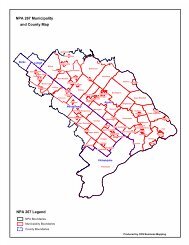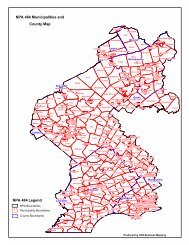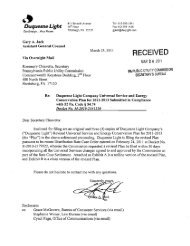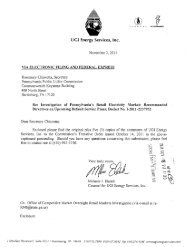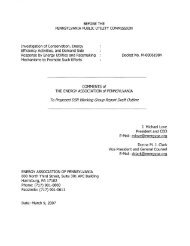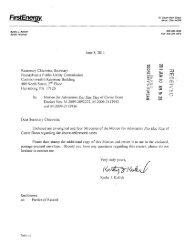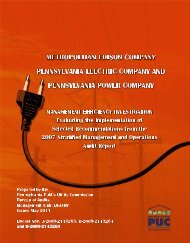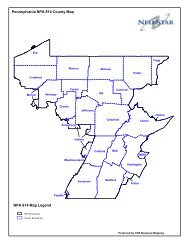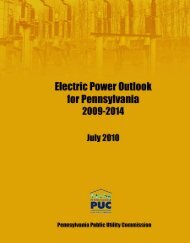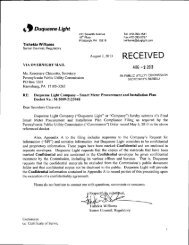Briefs - Philadelphia Area Industrial Energy Users Group
Briefs - Philadelphia Area Industrial Energy Users Group
Briefs - Philadelphia Area Industrial Energy Users Group
Create successful ePaper yourself
Turn your PDF publications into a flip-book with our unique Google optimized e-Paper software.
I. INTRODUCTIONOn October 15, 2008, Governor Edward G. Rendell signed into law House Bill 2200, orAct 129 of 2008 ("Act 129" or "Act"). Among other things, Act 129 expands the PennsylvaniaPublic Utility Commission's ("PUC" or "Commission") oversight responsibilities and sets forthnew requirements on Electric Distribution Companies ("EDCs") 1for energy conservation,default service procurements, and the expansion of alternative energy sources.Pursuant to Act 129, each EDC, acting as a Default Service Provider ("DSP"), "shalloffer [a] time-of-use [("TOU")] rates and real-time price plan to all customers that have beenprovided with smart meter technology . . . ." 2To satisfy the requirements of Act 129, residentialand commercial customers may elect to participate in either TOU rates or real-time pricing. 3On October 28, 2010, in compliance with Act 129, PECO <strong>Energy</strong> Company ("PECO" or"Company") submitted a Petition for Approval of its Initial Dynamic Pricing and CustomerAcceptance Plan ("Dynamic Pricing Plan" or "Plan"). As explained by PECO in its Petition, theDynamic Pricing Plan continues the Company's implementation of its Smart Meter TechnologyProcurement and Installation Plan ("Smart Meter Plan"). 4Through the Company's Plan, it proposes to offer two different rates options: critical peakpricing ("CPP") and TOU pricing. These rate options, as proposed, will be available toresidential customers (i.e., PECO Default Service Procurement Class 1) and small and mediumcommercial and industrial ("C&I") customers (i.e., PECO Default Service Procurement Classes 2and 3). 5The Company's Plan will not be available to large C&I customers (LC., PECO Default1As articulated in the Act, only EDCs with at least 100,000 customers are required to submit energy efficiency andconservation programs. See 66 Pa. C.S. § 2806.1, et seq.2See jd, at § 2807(f)(5).3I44See Petition of PECO <strong>Energy</strong> Company for Approval of its Smart Meter Technology Procurement and InstallationPlan, Docket No. M-2009-2123944 (Order entered May 6,2010).5See Petition for Approval of Initial Dynamic Pricing and Customer Acceptance Plan ("Petition"), at ^ 10-11.1
Accordingly, PAIEUG hereby submits this Main Brief to address the issue of recovery ofdevelopment and implementation costs of PECO's Dynamic Pricing Plan. As discussed morefully herein, PAIEUG supports the Company's and OSBA's proposed recovery methodology asjust, reasonable, and in accordance with the Commission's precedent on this issue.III.ARGUMENTThe Commission should approve PECO's proposed cost collection methodology, whichis supported by the OSBA, 9 and reject the OCA's flawed cost recovery proposal, 10 as theCompany's and OSBA's analyses of how these costs should be collected from customersappropriately acknowledges the Commission's precedent addressing this issue. Specifically,PECO proposes to collect the development and implementation costs associated with theCompany's Dynamic Pricing Plan from customers that are able to participate in the rate optionsoffered under the Plan - non-shopping, default service customers in Default Service ProcurementClasses 1,2 and 3."Conversely, the OCA's recommended modification to the Company's proposed costrecovery approach - to recover the costs of PECO's Plan from non-shopping customers andshopping customers in Default Service Procurement Classes 1, 2 and 3 - would result in unjustand unreasonable rates for shopping customers and should be rejected. By attempting to collectthese costs from all residential and small and medium C&I customers, the OCA proposes tosocialize these costs over a broad base of customers. In an attempt to justify the socialization ofthese costs, the OCA argues that shopping customers will benefit as much as default service8See PECO Statement No. 4, Direct Testimony of Mr. William J. Parterer (hereinafter, "PECO St. 4"), p. 9; PECOStatement No. 4-R, Rebuttal Testimony of Mr. William J. Patterer (hereinafter, "PECO St. 4-R"), p. 6.9See OSBA Statement No. I, Rebuttal Testimony of Mr. Robert D. Knecht (hereinafter, "OSBA St. 1"), pp. 3-5.10See OCA Statement No. 1, Direct Testimony of Mr. J. Richard Hornby (hereinafter, "OCA St. 1"), p. 20; OCAStatement No. 1-S, Surrebuttal Testimony of Mr. J. Richard Hornby ((hereinafter, "OCA St. 1-S"), pp. 11-12.11See PECO St. 4, pp. 9-11.12See OCA St. 1, p. 20.
provided by the Commission in the PPL TOU proceeding. 21Moreover, in opposing the OCA'srecommendation to contravene the Commission's prior guidance on this issue, the OSBA aptlypoints out that the OCA's proposal will "require shopping customers to pay for a program inwhich they cannot participate." 22The OSBA further recognizes that, "[t]o the extent that thoseshopping customers are already paying for the administrative costs incurred by their own EGSsrelated to dynamic pricing or other alternative rates, the shopping customers will end up payingtwice."This outcome simply would be inequitable and would inhibit competition in PECO'sservice territory.Accordingly, PECO's proposal to recover these development and implementation costsonly from default service customers adheres to the PUC's precedent and, therefore, should beapproved by the Commission. PAIEUG firmly believes that collecting the costs of the Plansolely from non-shopping, default service customers is the only reasonable method forrecovering these costs, as any other methodology would produce unjust and discriminatory ratesfor shopping customers.21Sge PECO St. 4-R, p. 6 ("Mr. Hornby's proposal is contrary to the Commission's decision in its March 9, 2010Order in PPL's TOU proceeding. In that case the OCA advanced essentially the same arguments Mr. Hornby hasmade in support of his proposal, and they were rejected by the Commission, which ruled that implementation costsassociated with PPL's TOU programs should be recovered through its default service surcharge mechanism.")22OSBA St. l,p.3.2314
IV.CONCLUSIONWHEREFORE, the <strong>Philadelphia</strong> <strong>Area</strong> <strong>Industrial</strong> <strong>Energy</strong> <strong>Users</strong> <strong>Group</strong> respectfullyrequests that the Pennsylvania Public Utility Commission approve PECO <strong>Energy</strong> Company'sproposal to collect development and implementation costs of PECO's Dynamic Pricing Planfrom non-shopping, default service customers only.Respectfully submitted,McNEES WALLACE & NURICK LLCCharis Mincavkge (1.0. No. 82039)Patrick L. Gregory (VA Bar I.D. No. 72987)Carl J. Zwick (I.D. No. 306554)100 Pine StreetP.O. Box 1166Harrisburg, PA 17108-1166Phone: (717) 232-8000Fax:(717)237-5300Counsel to the <strong>Philadelphia</strong> <strong>Area</strong> <strong>Industrial</strong> <strong>Energy</strong><strong>Users</strong> <strong>Group</strong>Dated: January 28, 2011C/5rnomzo —~—tS-p• oc:33mom•



